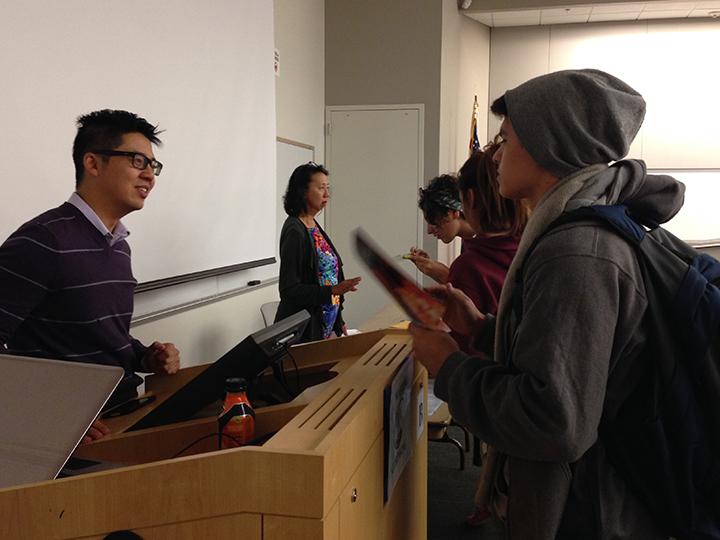Transcending gender in Asian cinema
Pacific Arts Movement Artistic Director Brian Hu and student Anthony Amato discuss the line-up for the 15th Annual San Diego Asian Film Festival in V-101 on Nov. 4. Photo credit: Angelica Wallingford
November 19, 2014
Seats in V-101 were filled quickly with students and staff to listen to Pacific Arts Movement’s Artistic Director Brian Hu introduce the 15th Annual San Diego Asian Film Festival to City College and deliver a history lesson on gender bending in Asian cinema.
“Every year we go to campuses and we do a little introduction about our film festival, but for City College we always do something a little bit special,” Hu said at the beginning of the Nov. 4 presentation. “We come up with a topic to go in detail on; sort of a cross section of our festival, a cross section of Asian cinema and just a way to show how a film festival could explore subjects a little bit more deep than just saying Asian cinema.”
The topic of the hour was not only focused on gender bending but themes that arise as the result of gender bending. The presentation consisted of classic and recent examples of the subject, including some films screening at the festival.
The first film that was discussed was the “The Love Eterne,” a 1963 Taiwanese Huangmei opera film that starred veteran Hong Kong actresses Ivy Ling Po and Betty Loh Ti. Known as the “Titanic” or “Gone with the Wind” of its day, it was a hit with everyone who saw it, especially women. In fact, a lot of actress’ who portrayed male roles, like Po and Cantonese opera actress Yam Kim Fai, became so popular with women that Hu said it was “ … like The Beatles had arrived.”
“Some scholars have tried to figure this out,” Hu explained. “One scholar in particular, she actually postulates that this movie was for housewives to have, what she calls, extramarital affairs or to desire other men but it wouldn’t seem so taboo because you were actually looking at a woman. So, because it’s a woman you wouldn’t necessarily think you were betraying your husband.”
Another film that was looked at was “Swordsman II,” in particular the character “Asia the Invincible” played by Brigitte Lin. This is a character who is sexually ambiguous, starting out as male in the beginning of the film and transitions into a woman throughout the film, having relationships with both men and women.
“Its how it’s happening in between during this moment of transition that … opens up possibilities of sexuality,” Hu explained.
Other films discussed were the documentaries screening at this year’s San Diego Asian Film Festival including “Kuma Hima,” which addresses transgender issues and “The Girl Princes,” about a popular 1950s all-female theater troupe in Korea, their relationships and their legions of adoring fans.
Hu also made the point throughout the entire presentation that the perception of the audience at the time these classic films were first being screened to audiences now were vastly different from each other. He tasked the audience with looking at all the different possibilities that these films have to offer and all the themes they explore.
“When you look at these older films, it forces you to ask questions about what are the different kind of possibilities with the history and our own possibilities as viewers; how are we going to read these films? Against the grain or however we want to position ourselves,” Hu explained.










